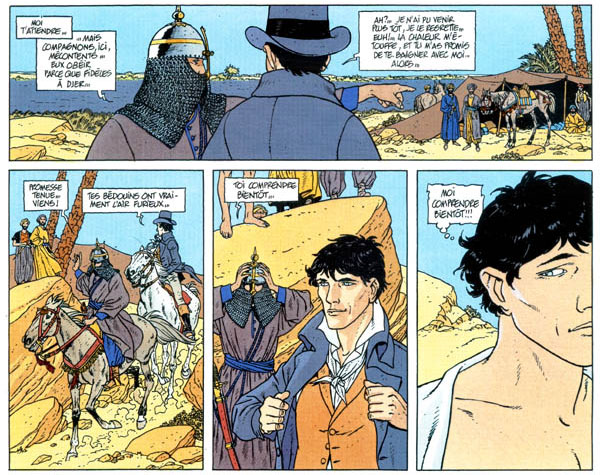'Les 7 Vies de l'Épervier' (1991).
André Juillard is one of the most productive and influential artists of historical comics in France. Born in Paris, Juillard attended the École Nationale Supérieure des Arts Décoratifs in Paris, and took courses in comics from Jean-Claude Mézières and Jean Giraud. In 1974, he began his professional career as an illustrator for the children's magazine Formule 1. He also drew the western story 'La Longue Piste de Loup Gris' for this magazine, and soon also made his appearance in the other magazines of Éditions Fleurus. He made an adaptation of 'Roméo et Juliette' with Jacques Josselin for the Fleurus girls' magazine Djin.
Juillard created his first historical series, starring the knight 'Bohémond de Saint-Gilles', in cooperation with scriptwriter Claude Verrien in Formule 1 in 1976. Following the death of the writer, the scripts were subsequently written by Pierre Marin from 1977 on. At the same time, Juillard created twelve comic stories with 'Isabelle Fantouri', a doctor with the World Health Organization, in cooperation with writer Josselin for Djin between 1976 and 1980. For the same magazine, he made 'Les Cathares' with Didier Convard in 1978. He also produced several short stories for Djin, Fripounet, Joker, Historiques and Okapi.
'Masquerouge'. Dutch-language version.
Juillard eventually left Fleurus and began a collaboration with Pif Gadget. For this magazine, he had already created 'Sens Dessus Dessours', a story based on the oeuvre of Jules Verne, in 1978. Between 1980 and 1982, he made a series of historical adventure comics about the masked criminal 'Masquerouge' with Patrick Cothias, as well as short stories with Jean Ollivier.
Around this time, Juillard was also hired regularly as an artist for historical comics on commission. For Éditions I.D.P. he made comics about the history of Loiret and Calvados in 1980 and 1981. He drew 'Le Secret de la Cathédrale' with the writers Jean Pénichon and Léon Wisznia for the Archeological Centre of Isère and the CNRS in 1981, and made 'Cheminot' about the French railways with Isidore Roland for Temps Actuels in 1982.
'Arno'.
Juillard and Cothias were present in Circus from 1982 on, with a sequel to 'Masquerouge' called 'Les Sept Vies de l'Épervier'. It became Juillard's best-known series that has been collected in book format by Glénat between 1983 and 1991. Another claim to fame came in 1983, when Juillard created 'Arno' with Jacques Martin. Juillard drew three stories of this series set in the Napoleon era for Circus and Vécu until 1987. The series was revived in the 1990s, but by then drawn by Jacques Denoël.
'Plume aux Vents'.
From 1984 on, Juillard was also a regular contributor of comic adaptations of novels for Je Bouquine. Juillard eventually established himself as a versatile illustrator for book covers, postcards and posters. Several monographies and portfolios with his illustrations have been published by Alain Beaulet, Daniel Maghen and Les Éditions du Pythagore throughout the years.
In 1993, he returned to contemporary comics with 'Le Cahier Bleu', for which he did both script and artwork. The first pages were published in À Suivre, and the story was published in book format by Casterman in 1994. Casterman also published his subsequent solo effort 'Après la Pluie' in 1998. In 1999, Juillard and Didier Convard drew a personal homage to Louis Forton's classic comic series 'Les Pieds Nickéles - Demain Sera Un Autre Jour' (Dargaud, 1999).
Blake & Mortimer - 'Les Sarcophages du 6e Continent'.
Juillard continued to work on new historical series with Patrick Cothias, starting off with 'Plume aux Vents', published in four books by Dargaud between 1995 and 2002. From 2000 on, he was one of the artists that revived Edgar Pierre Jacobs's classic 'Blake & Mortimer' series, creating new stories together with writer Yves Sente. Four books have been published in 2000, 2003, 2004 and 2008.
He additionally set up new contemporary comics, such as 'Le Long Voyage de Léna' and 'Léna et les Trois Femmes' in cooperation with Pierre Christin in 2006 and 2009. He teamed up with Yann to create the historical fiction comic 'Mezek' for Le Lombard in 2011. He is also involved in the cover artwork of Didier Convard's series 'Le Triangle Secret', published by Glénat.
He also contributed to an official collective homage 'Rocky Luke' (Goupil, 1983), paying tribute to Morris' 'Lucky Luke'.
In France, André Juillard was an influence on Patrick Jusseaume and Monsieur Le Chien. In Belgium, he inspired Yan Gevuld, Vincent Henin, Cédric Hervan, Marc Verhaegen and Philippe Wurm, while in The Netherlands he found a follower among Eric Heuvel.
'Mezek' (2011).








